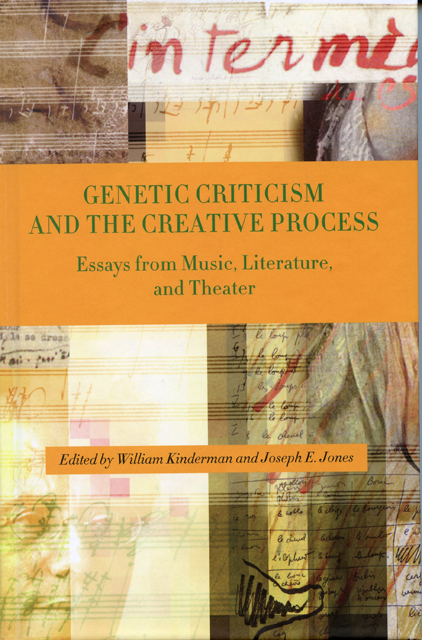Book contents
- Frontmatter
- Contents
- Acknowledgments
- Genetic Criticism and the Creative Process
- 1 Texts, Variants, and Variations: Evolving Contexts in Literature and Theater
- 2 Genetic Processes in Music: From Beethoven to Leroux
- 1 From Varieties of Genetic Experience to Radical Philology
- 2 Variant and Variation: Toward a Freudo-bathmologico-Bakhtino-Goodmanian Genetic Model?
- 3 The Genetic Record of a Voice: Variants in Barthes's Le Plaisir du texte
- 4 Can Genetic Criticism Be Applied to the Performing Arts?
- 5 “The hardy Laurel”: Beckett and Early Film Comedy
- 6 From Melodic Patterns to Themes: The Sketches for the Original Version of Beethoven's “Waldstein” Sonata, Op. 53
- 7 From Conceptual Image to Realization: Some Thoughts on Beethoven's Sketches
- 8 The Process within the Product: Exploratory Transitional Passages in Beethoven's Late Quartet Sketches
- 9 “They Only Give Rise to Misunderstandings”: Mahler's Sketches in Context
- 10 A Study of Richard Strauss's Creative Process: Der Rosenkavalier's “Presentation Scene” and “Schlußduett”
- 11 Genetic Criticism and Cognitive Anthropology: A Reconstruction of Philippe Leroux's Compositional Process for Voi(rex)
- Afterword
- Contributors
- Index
2 - Variant and Variation: Toward a Freudo-bathmologico-Bakhtino-Goodmanian Genetic Model?
Published online by Cambridge University Press: 02 March 2023
- Frontmatter
- Contents
- Acknowledgments
- Genetic Criticism and the Creative Process
- 1 Texts, Variants, and Variations: Evolving Contexts in Literature and Theater
- 2 Genetic Processes in Music: From Beethoven to Leroux
- 1 From Varieties of Genetic Experience to Radical Philology
- 2 Variant and Variation: Toward a Freudo-bathmologico-Bakhtino-Goodmanian Genetic Model?
- 3 The Genetic Record of a Voice: Variants in Barthes's Le Plaisir du texte
- 4 Can Genetic Criticism Be Applied to the Performing Arts?
- 5 “The hardy Laurel”: Beckett and Early Film Comedy
- 6 From Melodic Patterns to Themes: The Sketches for the Original Version of Beethoven's “Waldstein” Sonata, Op. 53
- 7 From Conceptual Image to Realization: Some Thoughts on Beethoven's Sketches
- 8 The Process within the Product: Exploratory Transitional Passages in Beethoven's Late Quartet Sketches
- 9 “They Only Give Rise to Misunderstandings”: Mahler's Sketches in Context
- 10 A Study of Richard Strauss's Creative Process: Der Rosenkavalier's “Presentation Scene” and “Schlußduett”
- 11 Genetic Criticism and Cognitive Anthropology: A Reconstruction of Philippe Leroux's Compositional Process for Voi(rex)
- Afterword
- Contributors
- Index
Summary
The aim of this chapter is to clarify the relationship between what genetic critics1 (or philologists) call variants and what musicians call variations.2 Some work that has been done to understand the nature of variation, and in particular Nelson Goodman's analysis of variation in terms of reference rather than according to formal criteria,3 can help us to define the status of variants. Such a definition may serve as a helpful complement to a general model of the genetic process based on a dialogic relationship between versions.
There is an obvious connection between the notions of variant and variation: both have to do with similarity and diversity. However, their core meanings are quite distinct despite the fact that in loose specialized usage, as well as in general parlance, the terms overlap (even dictionaries often use one word to define the other). Typically, one speaks of variants when there is a choice between elements regarded as equivalent, and of variation when the similar but different elements are juxtaposed in space or in time.
A few examples should clarify this issue. For an instance of genetic variant, we can look at the genesis of the first sentence of Virginia Woolf's novel Mrs. Dalloway, for which there are three extant versions. Virginia Woolf first wrote, “Mrs. Dalloway said she would buy the silk herself.” Then, she crossed out the word “silk” and inserted the word “gloves” in its place,5 and later on,6 the sentence became “Mrs. Dalloway said she would buy the fl owers herself.” Mrs Dalloway said she would buy the silk herself.
gloves
flowers
The three variant words are obviously different, yet we know that they are somehow equivalent. The fact that “silk,” “gloves,” and “fl owers” are substituted for one another in the same position unites them as part of the same paradigm. We can try to analyze what they have in common: all three are nouns, they refer to things one might purchase, and more specifically may be categorized as luxury goods.
Now let us consider an example of variation taken from a literary work that deliberately sets out to imitate musical forms: the “Sirens” episode of James Joyce's Ulysses.7
—He's killed looking back.
She laughed:
—O wept! Aren't men frightful idiots?
With sadness.
- Type
- Chapter
- Information
- Genetic Criticism and the Creative ProcessEssays from Music, Literature, and Theater, pp. 35 - 50Publisher: Boydell & BrewerPrint publication year: 2009
- 1
- Cited by



